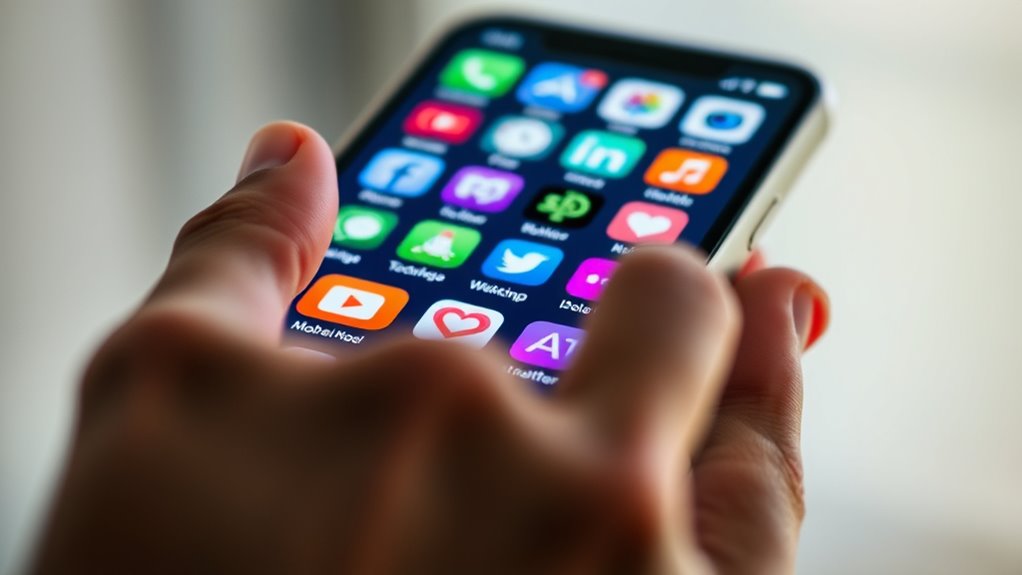When deciding which apps deserve your data, start by researching their reputation and privacy policies to make certain they handle information responsibly. Always review the permissions they request and take into account if they align with the app’s core features. Decline unnecessary access and seek alternatives if needed. Stay cautious and question why an app needs certain data—trustworthy apps only ask for what’s essential. If you want to learn more about safeguarding your personal information, there’s more to consider.
Key Takeaways
- Evaluate if the app’s permissions align with its core function before installation.
- Research the app’s reputation and privacy policy to assess data handling practices.
- Review and revoke unnecessary permissions after installation to protect your privacy.
- Prefer apps that request minimal permissions and provide transparent data usage.
- Consider alternative apps with better privacy practices if permissions seem excessive.

Have you ever wondered how to decide which apps truly deserve your data? With so many options available, it’s easy to feel overwhelmed by the constant requests for access to your personal information. The key is understanding how privacy concerns and app permissions play a role in protecting your data. When you download a new app, it often asks for permissions—access to your camera, microphone, contacts, location, and more. These requests can seem harmless, but they can also be a red flag if they seem excessive or irrelevant to the app’s core function. Before granting permissions, you need to ask yourself whether the app truly needs that information to operate effectively or if it’s just collecting data unnecessarily.
Your privacy concerns should always come first. Take a moment to review what permissions an app is asking for and consider whether they make sense. For example, if a simple flashlight app is requesting access to your contacts or location, that’s a clear sign you should think twice before granting it. Conversely, a GPS navigation app asking for location access is reasonable. Being cautious about app permissions helps you control what data you share and minimizes the risk of misuse. Remember, once you give an app access to certain information, it can be challenging to revoke that access later, especially if the app doesn’t make it easy to adjust permissions. Additionally, researching the app’s reputation and brand trustworthiness can help you determine if it’s safe to share your data.
Prioritize your privacy: review app permissions carefully and revoke access when in doubt.
It’s also smart to check the app’s privacy policy and reviews before downloading. These resources can give you insight into how an app handles your data and whether it has a history of privacy issues. When you’re aware of an app’s privacy concerns upfront, you’re better equipped to make informed decisions. Don’t be swayed by flashy promises or a sleek interface—what matters most is how your data is managed behind the scenes.
If an app’s permissions seem excessive or if the app doesn’t justify its data requests, don’t hesitate to decline or find an alternative. Many apps now offer limited permission options or function just fine without full access. Your data is valuable, and it’s worth protecting. Taking control over app permissions means you’re actively safeguarding your privacy and reducing exposure to potential security risks. Ultimately, deciding which apps deserve your data boils down to being vigilant, asking the right questions, and trusting your instincts to keep your information safe.
Frequently Asked Questions
How Can I Revoke App Permissions After Granting Access?
To revoke app permissions and restrict app access, go to your device’s settings. Find the app in your app list, then tap on it to access permissions. From there, disable or toggle off the permissions you want to revoke. This permission revocation prevents the app from accessing your data or features. Regularly review app access to protect your privacy and ensure only trusted apps have the permissions they need.
What Are Signs an App Is Requesting Unnecessary Data?
You notice app permission signs that seem overly intrusive or unrelated to its core function. Unnecessary data indicators include requests for access to your camera, microphone, or location when not essential. If an app asks for info it doesn’t need to perform its tasks, that’s a red flag. Trust your instincts—if something feels off, it’s likely requesting unnecessary data, and you should reconsider sharing that info.
Are There Tools to Monitor App Data Usage in Real-Time?
Yes, you can use app data monitors and tools for real-time data tracking on your device. These apps allow you to see how much data each app consumes and when, giving you immediate insight into your usage. Popular options include built-in features on smartphones, like Android’s Data Usage or iOS’s Cellular Data, as well as third-party apps like GlassWire or My Data Manager, which provide detailed real-time data tracking.
How Do I Differentiate Between Essential and Excessive App Data Collection?
Decipher data demands by discerning essential from excessive, focusing on data minimization principles. Ask yourself if the app truly needs the data it’s requesting or if it’s just collecting for convenience. Prioritize apps that respect your privacy and require clear user consent. If an app’s data collection feels excessive or invasive, it’s a red flag. Trust your instincts, and always opt for apps that minimize data collection while honoring your choices.
What Privacy Policies Should I Look for Before Installing an App?
Before installing an app, check its privacy policy for clear details on data encryption and third-party sharing. Look for policies that emphasize strong data encryption to protect your information and restrict third-party sharing unless you’ve explicitly consented. Avoid apps with vague or overly broad data collection statements. A transparent privacy policy shows the developer values your privacy and gives you control over how your data is used and shared.
Conclusion
So, next time an app asks for your data, remember it might not be the hero it claims to be. While you’re busy trusting it with your info, it could just be collecting more than you bargained for. Irony’s sweet, isn’t it? You’re the one handing over your data, yet often, you’re the last to know how it’s used. Stay sharp—your data’s worth more than you think.









